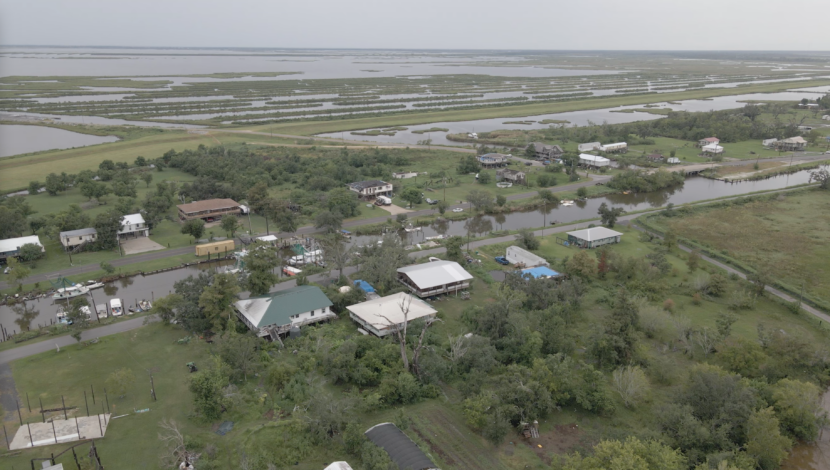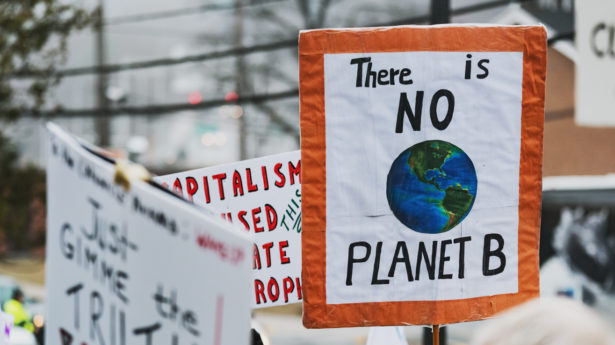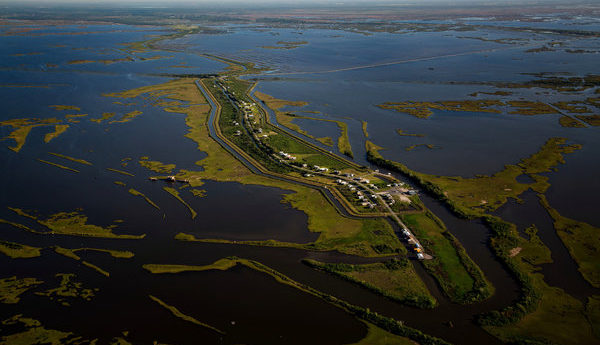The Unitarian Universalist Service Committee advances human rights through grassroots collaborations.
Indigenous Peoples’ Day: Tribal Responses to Land Loss

By Deanna Johnson on October 10, 2022
Indigenous Peoples’ Day is an opportunity to take back the narrative around the Native communities that have occupied the lands now known as the United States for time immemorial. For generations, Indigenous tribes have occupied lands from coast to coast, but European colonialism—beginning in the 1600s—would radically decimate and disperse these communities. Today, Indigenous tribes must battle an array of injustices, in particular, the dire effects of the climate crisis and the environmental racism that contributes to their continued oppression. As sacred lands are washed away or sink, the tribes are forced to discern new ways to recoup and recover. UUSC has partnered with a number of tribes in Louisiana and Alaska to call attention to this epidemic of climate injustice and environmental racism. One such mechanism for justice is in the United States’ collective response to loss and damage.
What is “Loss and Damage”?
The phrase “loss and damage” is used within the United Nation’s (UN) climate response framework and broader climate justice spaces to define the disastrous outcomes of climate change on global communities. Specifically, the term describes the, “consequences of climate change that go beyond what people can adapt to, or when options exist but a community doesn’t have the resources to access or utilize them.” Loss and damage is and will continue to harm vulnerable communities the most, making addressing the issue a matter of climate justice.
While it includes physical and economic consequences—including the disruption of water systems and the death of vital cash crops—it also includes consequences that lay outside the economic and the tangible and result in the destruction of invaluable and often irreplaceable aspects of community and cultural life. This is especially true for Indigenous communities, who are disproportionately impacted by climate change and thus disproportionately contend with subsequent losses and damage.
How Loss and Damage Surpasses Economic Consequences
Cultural heritage remains a key area affected by loss and damage. As climate disasters destroy physical lands, they also destroy spaces of cultural significance—spaces that connect today’s inhabitants with their ancestors and their community’s ways of life.
Within the southern coastal region of Louisiana, approximately 20% of wetlands have washed away since 1932, and a third of the remaining land is expected to erode by 2040. Rosina Philippe, elder of the Atakapa-Ishak Chawasha Tribe of Grand Bayou Village, expressed the effect that climate change has had on the land on which she was raised.
“When I was a child,” she shared, “we could walk and we could run. The land was hard. The land was high. The vegetation was different. We had fruit trees. We had garden plots. Today we don’t have any of that […] we have hardly no land left.”
Chief Demé Naquin Jr. of the Jean Charles Choctaw Nation paints a similar portrait. He noted that the marshlands are eroding at such a pace that the places in which he used to go trapping as a boy have now been destroyed. “You can’t tell where the Bayou was, because it’s all open water now,” he stated, “if I wouldn’t have grown up there, I wouldn’t know where to pass.”
Philippe also shared the reverberating effect that land loss and soil quality degradation from the rising sea has had on her community. In efforts to secure better lives for themselves and their families, members of the community have moved away, reducing the number of individuals present within Grand Bayou to share in the customs and heritage developed over generations within the Atakapa-Ishak Chawasha tribe. The factors causing individuals to move away were only exacerbated following Hurricane Ida’s 2021 landfall.
What’s Next?
A study published by Yale’s School of the Environment in 2021 concluded that Indigenous groups living within the United States have lost approximately 98.9% of their ancestral lands primarily due to seizure from the United States and other colonial governments as well as by extractive industries. As a result, Indigenous groups have been severely impacted by the losses and damage caused by climate change, and due to various political and economic factors, these same communities are left without resources to address the major impacts.
For example, in 1992, the Inupiaq residents of Alaska’s Kivalina village issued their first petition to state and federal officials for support in relocating from their coastal Alaskan home due to land erosion and catastrophic changes produced by climate change in the Arctic—in just 50 years Kivalina’s island land mass shrunk from 55 to just 27 acres. This petition launched a two-decade process with both the federal and Alaska state governments that wholly ignored the self-identified needs, recommendations, and desires of Kivalina residents. As of today, the United States has failed to implement a relocation framework for the residents of Kivalina or provide durable solutions or protection from climate disaster. According to Kivalina’s Strategic Management Plan, the island is expected to be uninhabitable as early as 2025.
In 2020, the Jean Charles Choctaw Nation, Pointe-au-Chien Indian Tribe, Grand Caillou/Dulac Band, and Grand Bayou Village of Louisiana along with the Kivalina Inupiaq village of Alaska submitted a joint complaint to the UN Special Rapporteur. Within the complaint, the tribes included a series of recommendations for the United States, Louisiana, and Alaska governments to address and rectify the human rights violations inflicted by climate change loss and damage. Among the recommendations was the inclusion of Indigenous voices into policy conversations.
On October 28th, the Jean Charles Choctaw Nation, Pointe-au-Chien Indian Tribe, Grand Caillou/Dulac Band, Grand Bayou Village, and Native Village of Kivalina will testify during a public hearing before the Inter-American Court on Human Rights (IAHCR). The Tribes will address the government’s failure to protect coastal Tribes from the catastrophic impacts of climate change, leading to their forcible displacement from ancestral lands. The groups will also present a series of recommendations for public officials.
In November, the 27th Conference of Parties will be held. This event is an international gathering of nations and non-governmental organizations to discuss the climate crisis and potential solutions to address the impacts of climate change, including loss and damage. Stay tuned for more information as representatives from UUSC and its partners will be in attendance.
Image Credit: Nathan Johnson, Craig Richard

